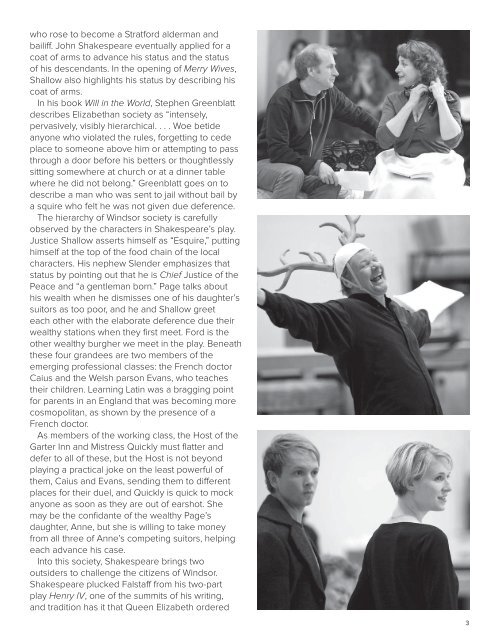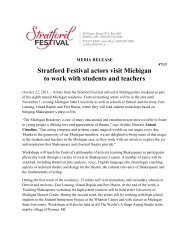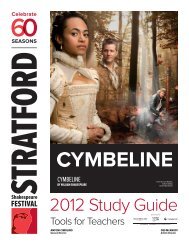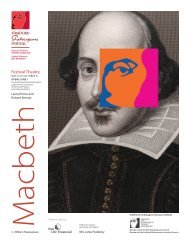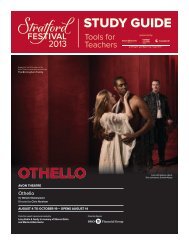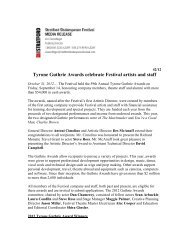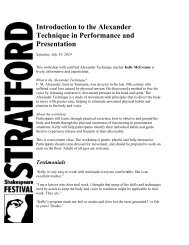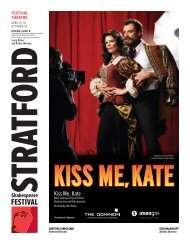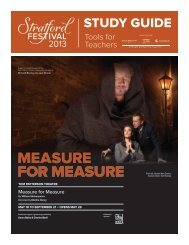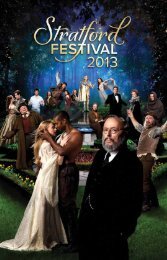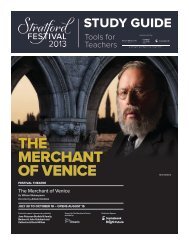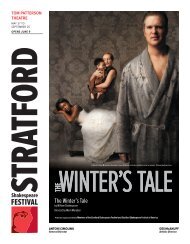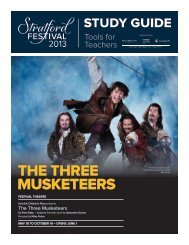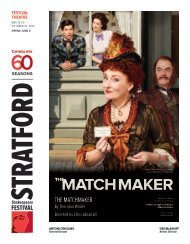The merry wives of windsor - Stratford Festival
The merry wives of windsor - Stratford Festival
The merry wives of windsor - Stratford Festival
Create successful ePaper yourself
Turn your PDF publications into a flip-book with our unique Google optimized e-Paper software.
who rose to become a <strong>Stratford</strong> alderman and<br />
bailiff. John Shakespeare eventually applied for a<br />
coat <strong>of</strong> arms to advance his status and the status<br />
<strong>of</strong> his descendants. In the opening <strong>of</strong> Merry Wives,<br />
Shallow also highlights his status by describing his<br />
coat <strong>of</strong> arms.<br />
In his book Will in the World, Stephen Greenblatt<br />
describes Elizabethan society as “intensely,<br />
pervasively, visibly hierarchical. . . . Woe betide<br />
anyone who violated the rules, forgetting to cede<br />
place to someone above him or attempting to pass<br />
through a door before his betters or thoughtlessly<br />
sitting somewhere at church or at a dinner table<br />
where he did not belong.” Greenblatt goes on to<br />
describe a man who was sent to jail without bail by<br />
a squire who felt he was not given due deference.<br />
<strong>The</strong> hierarchy <strong>of</strong> Windsor society is carefully<br />
observed by the characters in Shakespeare’s play.<br />
Justice Shallow asserts himself as “Esquire,” putting<br />
himself at the top <strong>of</strong> the food chain <strong>of</strong> the local<br />
characters. His nephew Slender emphasizes that<br />
status by pointing out that he is Chief Justice <strong>of</strong> the<br />
Peace and “a gentleman born.” Page talks about<br />
his wealth when he dismisses one <strong>of</strong> his daughter’s<br />
suitors as too poor, and he and Shallow greet<br />
each other with the elaborate deference due their<br />
wealthy stations when they first meet. Ford is the<br />
other wealthy burgher we meet in the play. Beneath<br />
these four grandees are two members <strong>of</strong> the<br />
emerging pr<strong>of</strong>essional classes: the French doctor<br />
Caius and the Welsh parson Evans, who teaches<br />
their children. Learning Latin was a bragging point<br />
for parents in an England that was becoming more<br />
cosmopolitan, as shown by the presence <strong>of</strong> a<br />
French doctor.<br />
As members <strong>of</strong> the working class, the Host <strong>of</strong> the<br />
Garter Inn and Mistress Quickly must flatter and<br />
defer to all <strong>of</strong> these, but the Host is not beyond<br />
playing a practical joke on the least powerful <strong>of</strong><br />
them, Caius and Evans, sending them to different<br />
places for their duel, and Quickly is quick to mock<br />
anyone as soon as they are out <strong>of</strong> earshot. She<br />
may be the confidante <strong>of</strong> the wealthy Page’s<br />
daughter, Anne, but she is willing to take money<br />
from all three <strong>of</strong> Anne’s competing suitors, helping<br />
each advance his case.<br />
Into this society, Shakespeare brings two<br />
outsiders to challenge the citizens <strong>of</strong> Windsor.<br />
Shakespeare plucked Falstaff from his two-part<br />
play Henry IV, one <strong>of</strong> the summits <strong>of</strong> his writing,<br />
and tradition has it that Queen Elizabeth ordered<br />
3


